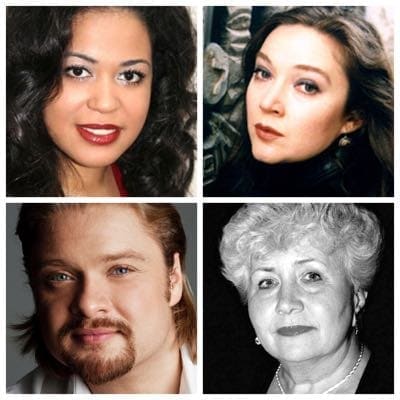In a concert that rang the rafters and tugged at the heartstrings, the Russian Chamber Art Society bade a thrilling farewell to its longtime home at the Austrian embassy, which, after hosting more than 440 events over the last four years, will henceforth devote its hall exclusively to the Austrian Cultural Forum series. The three singers—soprano Zhanna Alkhazova, mezzo-soprano Susana Poretsky, and tenor Viktor Antipenko, supported by accompanist Vera Danchenko-Stern, the society’s founder and artistic director—served the composers well, adding occasional interpretive flourishes accommodated by or in synch with the mood and intent of the piece.

The songs of the composers this concert celebrated (if not always or exclusively their oeuvre as a whole) owe a debt to the German 19th-century musical school. Indeed, all four—Mikhail Glinka, Anton Arensky, Sergei Taneyev, and Sergei Rachmaninoff—either studied with representatives of it or composed at times, to varying degrees, in its style.
Taken from the last line of the evening’s first song, the program’s title (“. . .Tender tears and love and life”) aptly encapsulated both song and program. Often regarded as the “founding father” of Russian classical music, Glinka is less known, at least in the West, for his art songs than he is for his symphonic works and operas. Arensky and Taneyev are nearly forgotten, while Rachmaninoff is known mainly for his symphonies and piano concertos. This concert, in the opinion of this reviewer, offered ample reason for that inattention to be reconsidered.
In the aforementioned song, Glinka’s yearning “I Remember that Magical Moment,” Viktor Antipenko, sleek in a black tuxedo with ivory tie and vest, was a commanding presence whose lyrical expressiveness served a musical sensibility at one with the Schubertian pathos and melodiousness of this ode to a beloved. His dynamic sweeps were vivid and compelling, his pianissimo passages exquisitely tender, with masterfully controlled vibrato, enhanced all around by a highly effective, unapologetically operatic theatricality. (Antipenko has won international acclaim in roles from Lohengrin to Don Jose.)
The second Glinka song, “The Poor Stranger,” is darker, more Schumannesque, and Antipenko was equally effective in conveying the ravages of lost love. Seconds later, spinning on an emotional dime, the tenor burst forth in joyous adoration in “To Her,” his ringing top notes contrasting with mischievous grins as he promised “To approach your mouth and kiss it many times.”
Mezzo-soprano Susana Poretsky started out slowly and tended toward histrionics, but warmed up nicely throughout the evening, offering vibrant high notes, including explosively rich ones, in Anton Arensky’s affecting “The Broken Vase” and “Don’t Turn On the Light.” This was followed, in the second half of the program, by engrossing drama, highlighted by a persuasive anger and desperation manifested by gripping chest notes, in Rachmaninoff’s “Oh, Do Not Grieve” and “Believe Me Not.”
In Sergei Taneyev’s “In the Invisible Haze” and “My Restless Heart Is Beating,” soprano Zhanna Alkhazova, whose opening duet with Poretsky, Taneyev’s “Mountain Peaks,” had suggested an agreeably capable singer, abandoned the modest wrapping. As a soloist, Alkhazova revealed an instrument capable of heart-stopping mastery, shifting swiftly from sounds of burnished gold to softly pinging, pitch-perfect tones, all in the upper register.
In each of the songs, Vera Danchenko-Stern was indispensable as both anchor and partner, coach and performer, at once carefully watching the singers for cues, and providing her own.
The second half of the program was devoted to Rachmaninoff, and began with a duet: not between singers, but between soprano and violin. The pairing was inspired by an anecdote, related by Danchenko-Stern, that had violinist Fritz Kreisler walking in on the composer accompanying tenor John McCormack in his (Rachmaninoff’s) “Oh, Never Sing to Me Again.” Observing that the work lacked something: namely, a violin part, Kreisler soon had one from his friend.
For this concert, the piece returned to being a duet. But the part that was missing was not the violin. Leo Sushansky’s melancholy, almost Hebraically elegiac violin set the mood as soprano Zhanna Alkhazova, her sound utterly ravishing, joined in what was to become a deeply emotional dialogue, not just between singer and violinist, but between performers and composer.
In “A Prayer,” a song of self-recrimination for having ignored a young man who loved her, Alkhazova evoked the protagonist’s despair with rich, dark vibrato, transforming in the blink of an eye to near-antic anticipation in “I Wait for Thee.”
Returning to the stage, tenor Viktor Antipenko showed yet another side of his vocal and dramatic abilities in “How Fair This Spot,” his portrayal bespeaking the idealized, romantic innocence of youth, ending with a gorgeous falsetto that tenderly descended to a sweet piano. In “The Answer,” another ode to love, we were again treated to a brilliant top note made all the more dazzling by its ease of both delivery and, as before, dynamic-shifting.
In “Spring Waters,” which heralds the season’s arrival, Antipenko surpassed all reasonable expectations, his theatricality skillfully delineating sweeping arcs of emotion, his histrionics rewardingly of a piece with the coruscating goldenness of an impossibly high end note, flung out in a gloriously triumphant, triple-f fortissimo.
An appropriate ending to a review of a concert that this critic thinks earned, and deserves, a triple-a bravissimo.
Running Time: One hour and 40 minutes, including a 15-minute intermission.
…TENDER TEARS, AND LOVE, AND LIFE was performed on April 28, 2016 at The Russian Chamber Society performing at the Austrian Embassy – 3524 International Court, NW, in Washington, DC.
RATING:




